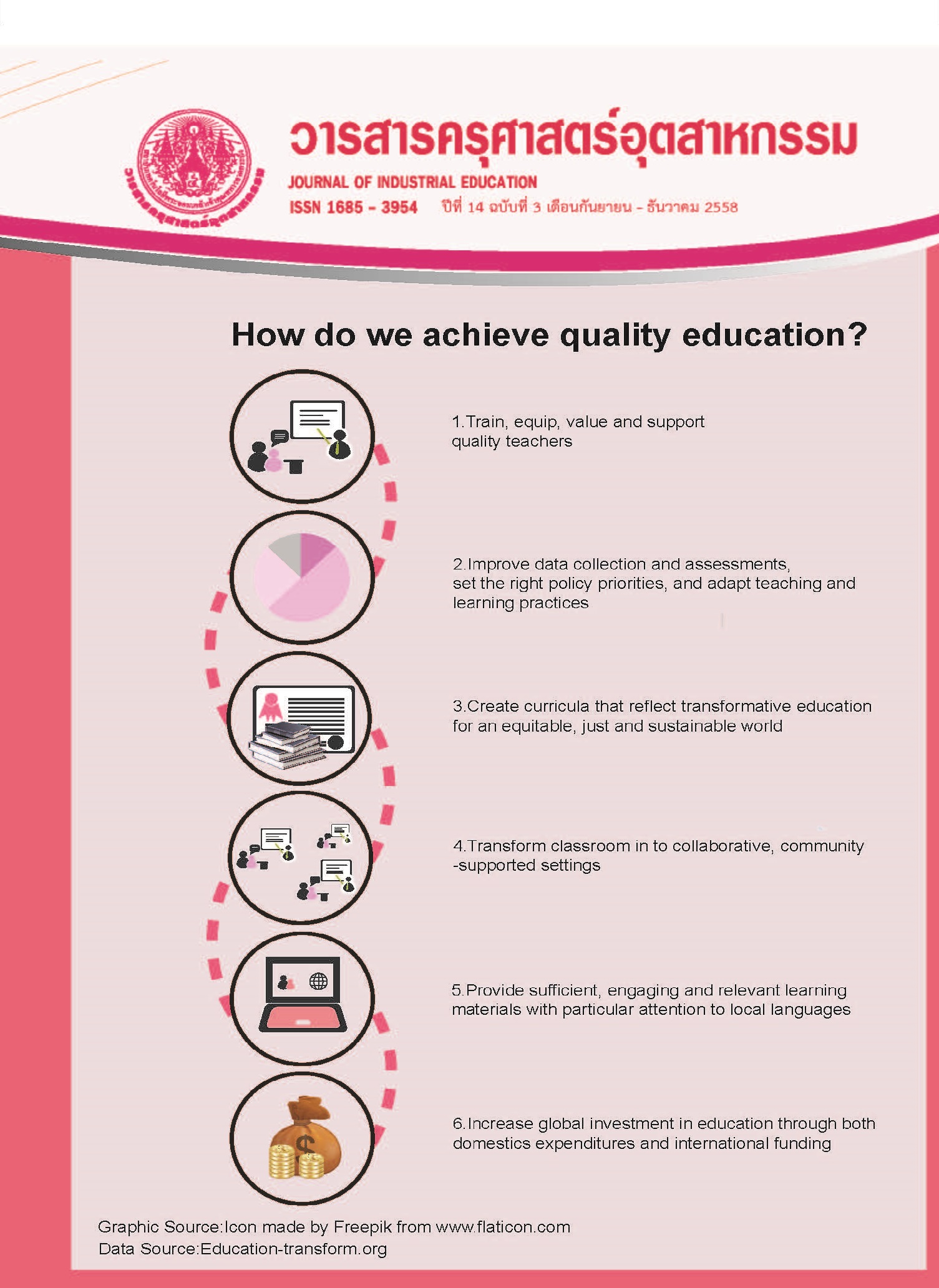The Development of Instructional Packages for Reinforce The System Thinking with Cooperative and Problem-Based Learning for Mathayomsuksa 5 at Bodindecha (Sing Singhaseni) School
Main Article Content
Abstract
The objective of this study were 1) to develop and examine efficiency of system thinking reinforcement instructional packages with cooperative and problem-based learning approaches in Robot Development Programming subject and 2) to compare system thinking of the students before and after learning with developed instructional packages. The sample group of the research comprised 80 fifth-grade students in the second semester of the academic year 2014 at Bodindecha (Sing Singhaseni).
The research instruments included 1) The system thinking reinforcement instructional package with cooperative and problem-based learning approach on Robot Motion Control, 2) system thinking test, and 3) an instructional packages evaluation form. The data analyzed by using arithmetic mean, percentage, standard deviation, E1/E2 and t-test for dependent sample. The results were as follows
1) Content quality of the system thinking reinforcement instructional packages with cooperative and problem-based learning approaches in Robot Development Programming subject was at an excellent level
2) Efficiency E1/E2 of the instructional packages was 73.67/74.20, which met the standard criteria of 70/70.
3) System thinking of the students after learning with the system thinking reinforcement instructional packages with cooperative and problem-based learning approaches was significantly higher than before learning with the packages at .05.
Article Details
"The opinions and contents including the words in papers are responsibility by the authors."
"ข้อคิดเห็น เนื้อหา รวมทั้งการใช้ภาษาในบทความถือเป็นความรับผิดชอบของผู้เขียน"
References
[2] พิมพันธ์ เดชะคุปต์. 2554. การเรียนการสอนที่เน้นผู้เรียนเป็นสำคัญ แนวคิด วิธีและเทคนิคการสอน. พิมพ์ครั้งที่ 2. กรุงเทพฯ : เดอร์มาสเตอร์กรุ๊ป แมนเนจเม้นท์.
[3] ชัยยงค์ พรหมวงศ์. 2551. เอกสารประกอบการสอน ชุดการสอนระดับประถมศึกษา. กรุงเทพฯ : ภาพพิมพ์.
[4] Johnson, R.T. & Johnson, D.W. 1986. Action research : Cooperative learning in the science classroom. Science and Children, 24, p. 31-32.
[5] Hmelo-Silver, C. E. 2004. Problem-based learning : What and how do students learn?. Educational Psychology Review, 16(3), p. 235-266.
[6] ระพินทร์ โพธิ์ศรี. 2547. เอกสารประกอบการสอน การสร้างและวิเคราะห์คุณภาพชุดการสอน. คณะครุศาสตร์ มหาวิทยาลัยราชภัฏอุดตรดิตถ์.
[7] ไสว ฟักขาว. 2544. การจัดการเรียนการสอนที่เน้นผู้เรียนเป็นศูนย์กลาง. สถาบันราชภัฏ จันทรเกษม.
[8] Barry Richmond. 1987. System Dynamics/Systems Thinking: Let's Just Get On With It. in The Fifth Discipline, p. 74-75.
[9] นราธิป มีศาสตร์. 2549. การพัฒนาและหาประสิทธิภาพชุดการสอน วิชาคอมพิวเตอร์ช่วยออกแบบและวิเคราะห์วงจร หลักสูตรการศึกษาบัณฑิต สาขาเทคโนโลยีอุตสาหกรรม คณะศึกษาศาสตร์ มหาวิทยาลัยบูรพา. วิทยานิพนธ์ครุศาสตร์ อุตสาหกรรมมหาบัณฑิต สาขาวิชาไฟฟ้า บัณฑิตวิทยาลัย สถาบันเทคโนโลยีพระจอมเกล้าพระนครเหนือ.
[10] ชูศักดิ์ โสชะรา. 2553. การพัฒนาชุดการสอน เรื่องคำสั่งพื้นฐานในการควบคุมหุ่นยนต์วิชาการเขียนโปรแกรมควบคุมหุ่นยนต์ สำหรับนักเรียนชั้นมัธยมศึกษาปีที่ 4. วิทยานิพนธ์ครุศาสตรมหาบัณฑิต ภาควิชาหลักสูตรและการสอน. คณะครุศาสตร์ มหาวิทยาลัยราชภัฏบุรีรัมย์.
[11] Checkland, P. 1981. Systems Thinking, Systems Practice. Chichester: John Wiley.
[12] Despres, Blabe R. 2005. Systemic thinking and Education Leadership : Some consideration. Accessed November 24. Available : feom http//ucalgry.ca/iejill/volome8/Despres7.html
[13] วัชรา เล่าเรียนดี. 2548. เทคนิคและยุทธวิธีพัฒนาทักษะการคิด การจัดการเรียนรู้ที่เน้นผู้เรียนเป็นสำคัญ. คณะศึกษาศาสตร์ มหาวิทยาลัยศิลปากร.
[14] พรพรรณ ธาราแดน พรรณี ลีกิจวัฒนะ และปริยาภรณ์ ตั้งคุณานันต์. 2556. ตัวแปรที่ส่งผลต่อผลสัมฤทธิ์ทางการเรียนวิชา คอมพิวเตอร์ของนักเรียนชั้นประถมศึกษาปีที่ 5 โรงเรียนอัสสัมชัญธนบุรี.วารสารครุศาสตร์ อุตสาหกรรม, 12(2), น.136-143.

